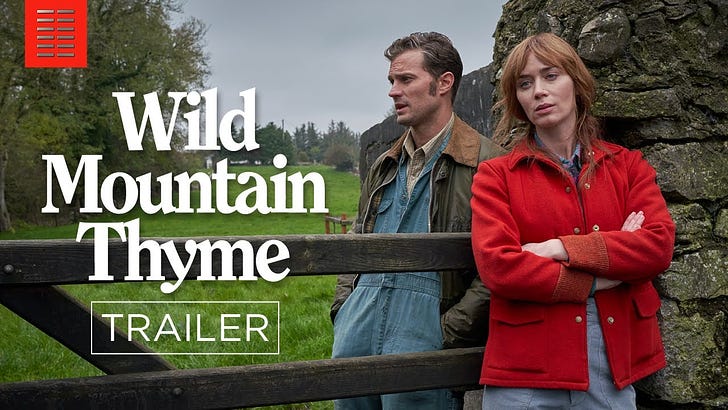Going off topic for a bonus newsletter, since I have to share my thoughts while they’re still fresh. We’ll return to your regularly scheduled programming on Tuesday.
You may have heard about Wild Mountain Thyme, the romantic comedy by the Pulitzer-winning playwright and screenwriter John Patrick Shanley. You have have heard that the trailer caused an accent emergency in Ireland. You may have heard about the weird twist near the end. You may have heard this is a bad movie.
You have heard wrong.
I cannot say it is a good movie, exactly. There are movies that leave you with a sense that the writer, director, and actors worked toward the creation of a satisfying story, a nice three-act structure that ticks all the boxes of plot and characterization and wraps up the protagonists’ problems.
This is not that kind of a movie. This is a movie that defies your simple categories of “good” and “bad.” This movie loops itself from bad to good and back again so many times I lost all sense that objective quality might even exist by the time the credits rolled.
But forget all that. Forget that Walken’s often emotionally affecting performance is overlaid with a Darby O’Gill and the Little People accent. Forget that Emily Blunt wears a flock of auburn wigs and a wardrobe sourced from the closet of a Victorian ghost. Forget Jamie Dornan’s distractingly weird little pasted-on-looking sideburns and the Rogue-from-the-X-Men streak of white in his hair. Forget that the movie is clearly set in the present day yet all the characters dress like they’re in a 1950s Irish Tourism Board brochure. Forget the random coracle, the dozens of animal reaction shots, the bee thing.
The star of the movie is the dialogue by, again, Pulitzer prize winning playwright Shanley:
My name’s Tony Reilly. I’m dead!
Mother Nature, why did you make me so? – delivered by a 10-year-old boy
A father and his despondent 10-year-old daughter:
“What’s the matter?”
“I have no purpose. I’m just a girl, and the world is full of girls.”
“Look at you. You can’t even love a dog.”
“He tore holes in the sky with that gun.”
Both people in conversation laugh as if this is the funniest thing ever said.
“Will you take a stout?”
“In the bottle or the can?”
“In the bottle.”
“Noooo thanks! The bottle tastes of glass.”
“Does glass have a taste then?”
“It does. Glass tastes of teeth.”
“I’ll be dead by Christmas.”
“Well just… don’t.”
“Some of us don’t have joy, but do what we must. Is a man who does what he must but feels no pleasure less of a man than one who’s happy?”
“Where do we go when we die? The sky?”
“The ground.”
“Then what’s the sky for?”
“That’s for now. The sky is for now.”
“It’s Bad News Cleary.”
“Why do you call him that?”
“Because he only brings bad news.”
Cleary delivers bad news
The above dialogue is all from the first twenty minutes of the film.
You can see the shape of an almost-conventional, whip-smart movie straining to be born, and it’s twin, a script that the ghost of Tennessee Williams would flip through and say “I don’t know, it seems a little mannered and over the top? A little too… theatrical?” These movies are woven together like strands of a rope, there’s no separating them without destroying the whole thing.
Wild Mountain Thyme cannot be judged by our conventional standards, any more than that other absurdist modern classic, Cool As Ice. These are movies that cannot be categorized. They simply are.
You cannot explain Wild Mountain Thyme. It can only be experienced, and I would strongly recommend you do just that.



